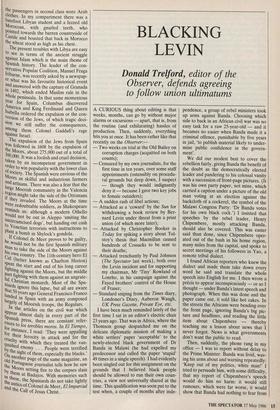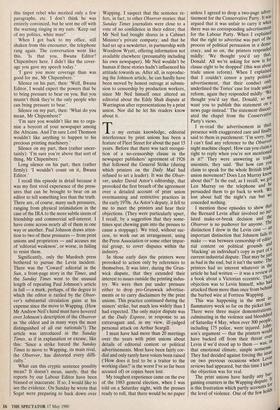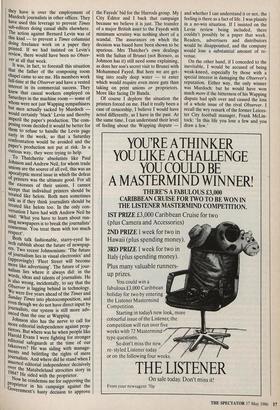BLACKING LEVIN
Donald Trelford, editor of the
Observer, defends agreeing to follow union ultimatums
A CURIOUS thing about editing is that weeks, months, can go by without major alarms or excursions — apart, that is, from the routine (and exhilarating) hassles of production. Then, suddenly, everything hits you at once. It has been rather like that recently on the Observer:- — Two weeks on trial at the Old Bailey on corruption charges (acquitted on both counts); — Censured by my own journalists, for the first time in ten years, over some staff appointments (ostensibly on procedu- ral grounds but deep down, I suspect — though they would indignantly deny it — because I gave two key jobs to female outsiders); — A sudden rash of libel actions; — Attacked as a 'coward' by the Sun for withdrawing a book review by Ber- nard Levin under threat from a print union (of which more later); — Attacked by Christopher Booker in Today for spiking a story about Tol- stoy's thesis that Macmillan caused hundreds of Cossacks to be sent to their deaths; — Attacked trenchantly by Paul Johnson (The Spectator last week), both over the Levin incident and for supporting my chairman, Mr 'Tiny' Rowland of Lonrho, in his campaign against the Fayed brothers' control of the House of Fraser; — Standard sniping from the Times diary, Londoner's Diary, Auberon Waugh, UK Press Gazette, Private Eye, etc.
I have been much reminded lately of the first time I sat in an editor's electric chair 23 years ago. That was in Africa, where the Thomson group despatched me on the delicate diplomatic mission of making a white settlers' paper 'acceptable' to the newly-elected black government of Dr Banda in Malawi (he had expelled my predecessor and called the paper 'stupid' 49 times in a single speech). I had evidently been singled out for this assignment on the grounds that I believed black people should be allowed to run their own coun- tries, a view not universally shared at the time. This qualification was soon put to the test when, a couple of months after inde- pendence, a group of rebel ministers took up arms against Banda. Choosing which side to back in an African civil war was no easy task for a raw 25-year-old — and it becames no easier when Banda made it a criminal offence, punishable by five years in jail, 'to publish material likely to under- mine public confidence in the govern- ment'.
We did our modest best to cover the rebellion fairly, giving Banda the benefit of the doubt as the democratically elected leader and pandering to his colossal vanity with a succession of front-page pictures. (It was his own party paper, not mine, which carried a caption under a picture of the old man voting at an election against the backcloth of a cockerel, the symbol of the Malawi Congress Party: 'Dr Banda votes for his own black cock.') I insisted that speeches by the rebel leader, Henry Chipembere, mostly attacking Banda, should also be covered. This was easier said than done, since Chipembere oper- ated out of the bush in his home region, many miles from the capital, and spoke to secret meetings of his followers in Yao, a remote tribal dialect.
I found African reporters who knew the dialect and made them take down every word he said and translate the whole speech into English for me,I then wrote a précis to appear inconspicuously — or so I thought — under Banda's latest speech and photograph. When this was done and the paper came out, it sold like hot cakes. In the streets the Africans were bending over the front page, ignoring Banda's big pic- ture and headlines, and reading the little item about Chipembere — thereby teaching me a lesson about news that I never forgot. News is what governments don't want the public to read.
Then, suddenly, the phone rang in my office — I was to report without delay to the Prime Minister. Banda was livid, wav- ing his arms about and warning repeatedly: `Keep out of my politics, white man!' I tried to persuade him, with some difficulty, that my report of Chipembere's speech would do him no harm: it would still rumours, which were far worse, it would show that Banda had nothing to fear from this tinpot rebel who merited only a few paragraphs, etc. I don't think he was entirely convinced, but he sent me off with the warning ringing in my ears: 'Keep out of my politics, white man!'
When I got back to my office, still shaken from this encounter, the telephone rang again. The conversation went like this. 'Is that you, Bwana Editor? Chipembere here. I didn't like the cover- age you gave my speech today.'
`I gave you more coverage than was good for me, Mr Chipembere.'
Silence on his part, then: 'Well, Bwana Editor, I would expect the powers that be to bring pressure to bear on you. But you mustn't think they're the only people who can bring pressure to bear.'
Silence on my part, then: 'What do you mean, Mr Chipembere?'
`I'm sure you wouldn't like me to orga- nise a boycott of your newspaper among the Africans. And I'm sure Lord Thomson wouldn't like anything to happen to his precious printing machinery.'
Silence on my part, then (rather uncer- tainly): 'I'm sure you're above that sort of thing, Mr Chipembere.'
Long silence on his part, then (rather firmly): 'I wouldn't count on it, Bwana Editor.'
I recall this episode in detail because it was my first vivid experience of the press- ures that can be brought to bear on an editor to tell something less than the truth. There are, of course, many such pressures, ranging from physical intimidation in the case of the IRA to the more subtle sirens of friendship and commercial self-interest. I have come across nearly all of them in one way or another. Paul Johnson draws atten- tion to two of these pressures — from print unions and proprietors — and accuses me of 'editorial weakness', or worse, in failing to resist them.
Significantly, only the Murdoch press bothered to pursue the Levin incident. There was the 'Coward' editorial in the Sun, a front-page story in the Times, and the Sunday Times went to the unusual length of repeating Paul Johnson's article in full — a mark, perhaps, of the degree to which the editor is rattled by the Obser- ver's substantial circulation gains at his expense since the move to Wapping. (How Mr Andrew Neil's hand must have hovered over Johnson's description of the Observer as 'the oldest and in many ways the most distinguished of all our nationals'!) The article was introduced in the Sunday Times, as if in explanation or excuse, like this: 'Since a strike forced the Sunday Times to move to Wapping, its main rival, the Observer, has distorted every diffi- culty.'
What can this cryptic sentence possibly mean? It doesn't mean, surely, that the reports by our Labour Editor have been biassed or inaccurate. If so, I would like to see the evidence. On Sunday he wrote that Sogat were preparing to back down over Wapping. I suspect that the sentence re- fers, in fact, to other Observer stories: that Sunday Times journalists were close to a vote of no confidence in their editor; that Mr Neil had bought shares in a Cabinet Minister's private company; and that he had set up a newsletter, in partnership with Woodrow Wyatt, offering information not available elsewhere (presumably including his own newspaper). Mr Neil wouldn't be human if these stories hadn't influenced his attitude towards us. After all, in reproduc- ing the Johnson article, he can hardly have been moved by honest outrage at submis- sion to censorship by production workers, since Mr Neil himself once altered an editorial about the Eddy Shah dispute at Warrington after representations by a print union. Nor did he let his readers know about it.
To my certain knowledge, editorial interference by print unions has been a feature of Fleet Street for about the past 15 years. Before that there was tacit recogni- tion of a no-censorship clause in the newspaper publishers' agreement of 1926 that followed the General Strike (during which printers on the Daily Mail had refused to set a leader). It was the Obser- ver, under David Astor's editorship, that provoked the first breach of the agreement over a detailed account of print union overmanning and restrictive practices in the early 1970s. As Astor's deputy, it fell to me to meet the printers and hear their objections. (They were particularly upset, I recall, by a suggestion that they some- times spat chewing gum into the presses to cause a stoppage). We tried, without suc- cess, to work out an arrangement, using the Press Association or some other impar- tial group, to cover disputes within the industry.
In those early days the printers were provoked to action only by references to themselves. It was later, during the Grun- wick dispute, that they extended their interest to issues outside the printing indus- try. We were then put under pressure either to drop pro-Grunwick advertise- ments or to carry disclaimers by the print unions. This practice continued during the miners' strike, but much less widely than I had expected. The only major dispute was at the Daily Express, in response to an extravagant and, in my view, ill-judged personal attack on Arthur Scargill.
I must have had more than 20 meetings over the years with print unions about details of editorial content or political advertisements. Most have been fairly cor- dial and only rarely have voices been raised ('How does it feel to be a traitor to the working class?' is the worst I've so far been accused of) or copies been lost.
My toughest experience came on the eve of the 1983 general election, when I was told on a Saturday night, with the presses ready to roll, that there would be no paper unless I agreed to drop a two-page adver- tisement for the Conservative Party. It was argued that it was unfair to carry it when there was no corresponding advertisement for the Labour Party. When I explained that the right to advertise was part of the process of political persuasion in a demo- cracy, and so on, the printers responded mildly: 'We thought you'd say that, Donald. All we're asking for now is for clause eight to be dropped' (this was about trade union reform). When I explained that I couldn't censor a party political advertisement, that their conduct only underlined the Tories' case for trade union reform, again they responded mildly: We thought you'd say that, Donald, so we want you to publish this statement on news page instead.' The statement dissoci- ated the chapel from the Conservative Party's views. I re-read the advertisement in then' presence with exaggerated care and finally said to them in puzzlement: 'I'm sorry, but I can't find any reference to the Observer night machine chapel. How can you claim a right to reply when you're not mentioned in it?' They were answering as trade unionists, they said. 'But how can you claim to speak for the whole British trade union movement? Does Len Murray know about this?' In the end, as I recall, we got Len Murray on the telephone and he persuaded them to go back to work. We lost about half the night's run but we conceded nothing. I mention these episodes to show that the Bernard Levin affair involved no ISO' lated make-or-break decision and the Observer is no pushover for anyone. The distinction I drew in the Levin case — important distinction that Johnson fails to make — was between censorship of edit(); rial content on political grounds an ° `blacking' an individual's copy as part of current industrial dispute. That may be Just as bad in the end, but it isn't the same. The printers had no interest whatever in the, article he had written — it was a review of a book about a Victorian eccentric. The,r objection was to Levin himself, who h.au, attacked them more than once from behind the barbed wire at Fortress Wapping. This was happening in the most .10- flammatory week so far on the picket line. There were three major demonstrations: culminating in the violence and bloodshed of Saturday 4 May, when over 300 people, including 175 police, were injured. John' son's argument — that the printers wow'. have backed off from their threat over Levin if we'd stood up to them — was, In that emotional climate, simple nonsense. They had decided against forcing the is on two previous occasions when Levi: reviews had appeared, but this time I knew the objection was for real. The print unions have hardly any bar, The counters in the Wapping dispute. , is this frustration which partly accounts foils the level of violence. One of the few holds they have is over the employment of Murdoch journalists in other offices. They have used this leverage to prevent Times sub-editors doing casual shifts elsewhere. The action against Bernard Levin was of this kind — to prevent a Times columnist doing freelance work on a paper they Printed. If we had insisted on Levin's review, there would have been no Obser- ver at all that week.
It was, in fact, to forestall this situation that the father of the composing room chapel came to see me. His members work full-time at the Observer and have a vested interest in its commercial success. They knew that casual workers employed on Saturdays in the machine room — some of whom were not just Wapping sympathisers but men actually sacked by Murdoch Would certainly 'black' Levin and thereby imperil the paper's production. The com- Posing room decided it would be better for them to refuse to handle the Levin page early in the week, so that a Saturday confrontation would be avoided and the Paper's production not put at risk. In a curious way, they were trying to help. To Thatcherite absolutists like Paul Johnson and Andrew Neil, for whom trade unions are the source of all evil, this was an apocalyptic moral issue in which the defeat of printers was the ultimate good. For all the excesses of their unions, I cannot accept that individual printers should be treated like helots. Both men sometimes talk as if they think journalists should be treated like helots too. In the only con- versation I have had with Andrew Neil he said: 'What you have to learn about run- ning newspapers is to break the journalists' consensus. You treat them with too much respect'.
Both talk fashionable, starry-eyed hi- tech rubbish about the future of newspap- ers: Two recent Johnsonisms: 'The future of Journalism lies in visual electronics' and (approvingly) 'Fleet Street will become more like advertising'. The future of jour- nalism lies where it always did: in the Words, ideas and talents of journalists. He is also wrong, incidentally, to say that the Observer is lagging behind in technology. We were five years ahead of the Times and Sunday Times into photocomposition, and even though we do not have direct input by Journalists, our system is still more adv- anced than the one at Wapping. Johnson also has the nerve to call for More editorial independence against prop- "ors. But where was he when people like Harold Evans I were fighting for stronger editorial safeguards at the time of our takeovers? He was siding with manage- ments and belittling the rights of mere Journalists. And where did he stand when I asserted editorial independence decisively over the Matabeleland atrocities story in 1984? He sided with the proprietor. Now he condemns me for supporting the proprietor in his campaign against the Government's hasty decision to approve the Fayeds' bid for the Harrods group. My City Editor and I back that campaign because we believe it is just. The transfer of a major British asset to the Fayeds with minimum scrutiny was nothing short of a scandal. The assurances on which the decision was based have been shown to be spurious. Mrs Thatcher's own dealings with the Sultan of Brunei (not Borneo, as Johnson has it) still need some explaining, as does her son's secret visit to Brunei with Mohammed Fayed. But here we are get- ting into really deep water — to enter which would require even more guts than taking on print unions or proprietors. More like facing Dr Banda.
Of course I deplore the situation the printers forced on me. Had it really been a case of censorship, I believe I would have acted differently, as I have in the past. At the same time, I can understand their level of feeling about the Wapping dispute — and whether I can understand it or not, the feeling is there as a fact of life. I was plainly in a no-win situation. If I insisted on the Levin review being included, there couldn't possibly be a paper that week. Readers, advertisers and distributors would be disappointed, and the company would lose a substantial amount of re- venue.
On the other hand, if I conceded to the inevitable, I would be accused of being weak-kneed, especially by those with a special interest in damaging the Observer's reputation. Either way, the only winner was Murdoch: but he would have won much more if the bitterness of his Wapping dispute had spilt over and caused the loss of a whole issue of the rival Observer. I recall the wry remark of the former Leices- ter City football manager, Frank McLin- tock: 'In this life you lose a few and you draw a few.'




















































 Previous page
Previous page